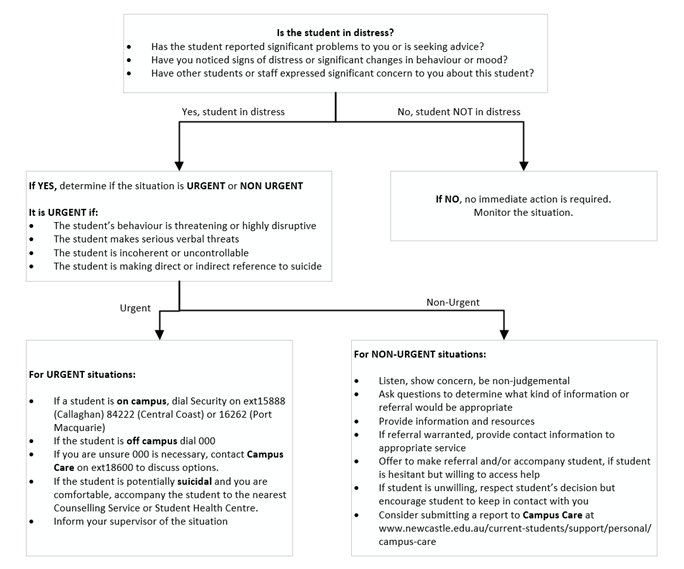Student stress and distress
The University of Newcastle cares about student health, wellbeing and success. Handling stress is part of student life, especially at peak times during the academic year. We know that many students are juggling high course loads with work, family and other commitments. For students who are under pressure, it’s easy for their academic progress to suffer before they realise what is happening. Common challenges students encounter include personal, social and academic pressures. They range from temporary setbacks such as a lower than expected grades to ongoing issues like financial hardship, managing physical or mental illness or a current crisis. When academics express their concern, students are more likely to activate their own coping strategies, access support networks and get back on track with minimal disruption to their lives. As a tutor, you might be the first person to notice that a student is experiencing difficulty inside or outside the classroom. Trust your professional judgement. Tutors play an important role in assisting students to become self-aware and act on their feelings.
Recognise the warning signs of distress
Some indicators that a students’ stress level may be cause for concern:
- increased absence from class
- withdrawal from class discussions
- isolation from peers
- problems concentrating, loss of interest, lack of energy, falling asleep in class
- increased irritability, emotional outbursts, crying in class
- rapid speech, confused thinking or writing
- changes in appetite, excessive weight loss or gain
- changes in hygiene or dress
- increased use of alcohol or recreational drugs
- disruptive, unusual or aggressive behaviour
- sharing personal problems with you
- missed assignments or a sudden drop in grades
In urgent situations when there is immediate risk of harm (for example, when a student is suicidal, threatening, out of touch with reality) be familiar with and follow emergency protocol to ensure the safety of yourself and others.
Call Security at:
- Callaghan 4921 5888
- Ourimbah 4388 4222
- Port Macquarie 6581 6262
Notify your supervisor, Campus Care and complete incident reports
Respond in a caring and non judgemental way
Students are likely to raise many concerns beyond the scope of your academic role. Some individuals will be more open to assistance than others. Talk to the student in private and listen sensitively. Express your concern and reassure them that times of challenge or crisis are also experienced by peers, and that accessing support is a positive step. Clarify what they need and refer them on to the relevant services. If you are unsure who is the best person to help a student, seek advice from the course co-ordinator. Follow up that they were able to access the right resources and that they are getting the help they need.
Report any concerns about distressed, disruptive, unusual or disturbing behaviour
If there is no immediate danger but you have any concerns about student behaviour and need advice, information or support then contact Campus Care on 4921 8600, campuscare@newcastle.edu.au and consult your Course Coordinator/Head of School. Note that students are required to behave in accordance with the UoN Code of Conduct. For assistance in the case of rude or disruptive classroom behaviour consult your Course Coordinator as well.
Refer to student support as required
Student Support Services are free and confidential, and provided by experienced professional staff. Services work in partnership so students will be referred to the most appropriate service, regardless of their first point of contact. Contact the University Counselling Service on the following numbers:
- Newcastle 4921 5801
- Ourimbah 4348 4060
- Port Macquarie 6581 6200
The University Health Service can be contacted on:
- Newcastle 4921 6000
- Ourimbah 4348 4060


